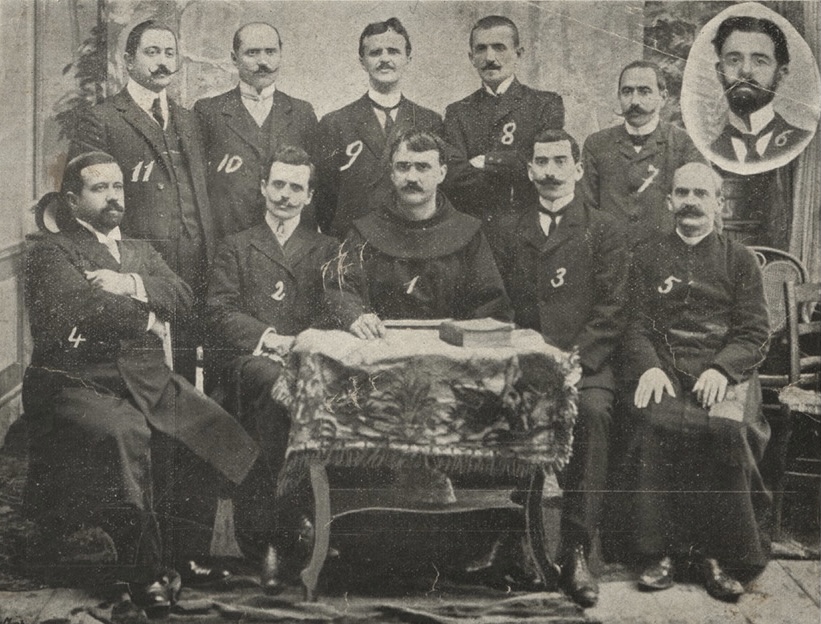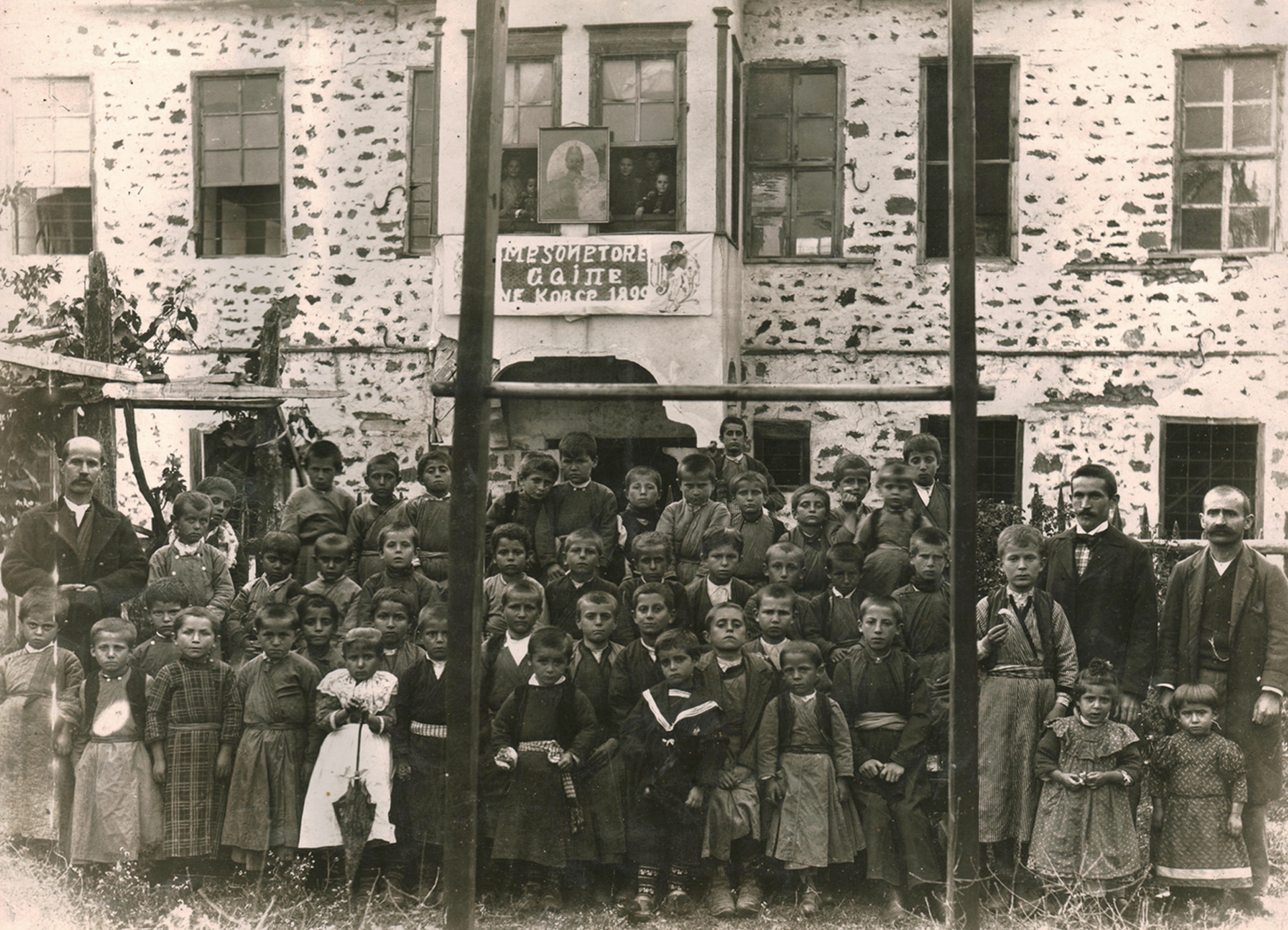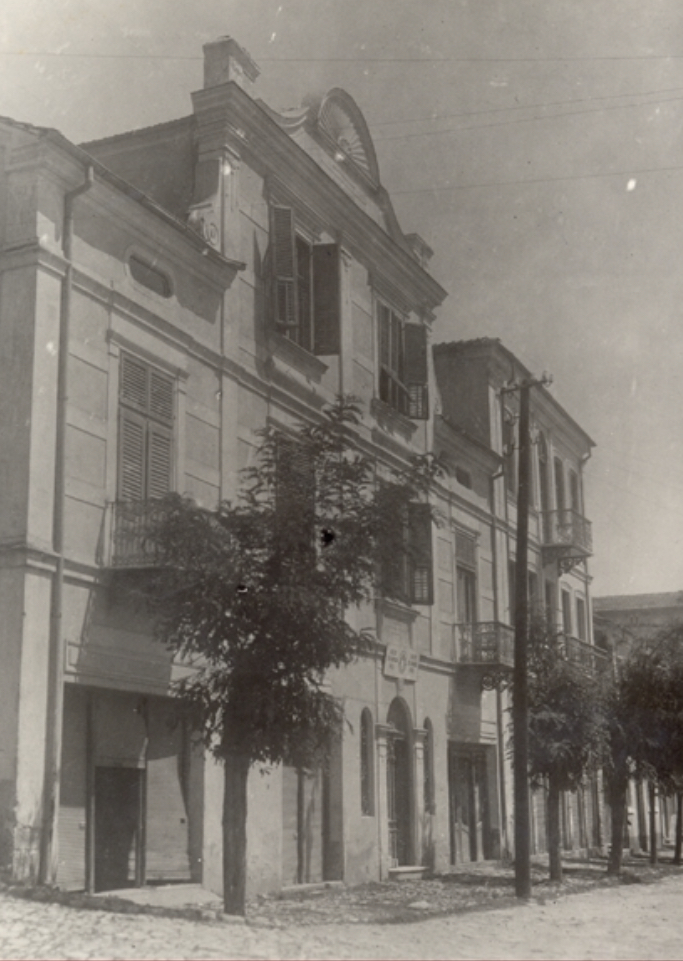Congress of Manastir on:
[Wikipedia]
[Google]
[Amazon]
 The Congress of Manastir () was an
The Congress of Manastir () was an
 The speeches of the first two days with regard to the alphabet were general in character, and helped to create the atmosphere in which to carry out the serious work. The representatives understood the importance of unity, regardless which alphabet was chosen. Gjergj Fishta, who praised the development of the Bashkimi alphabet, declared: “I have not come here to defend any one of the alphabets, but I have come here to unite with you and adopt that alphabet which the Congress decides upon as most useful for uplifting the people”. The audience was deeply moved by Fishta. Hodja Ibrahim Effendi, a Muslim clergyman, rushed to Fishta and embraced him with tears in his eyes.
At the beginning of the Congress, the delegates elected a commission consisting of eleven members (four Muslims, four Orthodox and three Catholics) to make a decision before the other delegates arrived. Gjergj Fishta was elected chairman of the commission, Parashqevi Qiriazi chairwoman and Mit'hat Frashëri its vice-chairman.
The speeches of the first two days with regard to the alphabet were general in character, and helped to create the atmosphere in which to carry out the serious work. The representatives understood the importance of unity, regardless which alphabet was chosen. Gjergj Fishta, who praised the development of the Bashkimi alphabet, declared: “I have not come here to defend any one of the alphabets, but I have come here to unite with you and adopt that alphabet which the Congress decides upon as most useful for uplifting the people”. The audience was deeply moved by Fishta. Hodja Ibrahim Effendi, a Muslim clergyman, rushed to Fishta and embraced him with tears in his eyes.
At the beginning of the Congress, the delegates elected a commission consisting of eleven members (four Muslims, four Orthodox and three Catholics) to make a decision before the other delegates arrived. Gjergj Fishta was elected chairman of the commission, Parashqevi Qiriazi chairwoman and Mit'hat Frashëri its vice-chairman.
 The adoption of a Latin character-based Albanian alphabet was considered an important step for Albanian unification. Some Albanian Muslims and clerics, preferring an Arabic-based alphabet, expressed their opposition towards the Latin script due to concerns that it would undermine ties with the
The adoption of a Latin character-based Albanian alphabet was considered an important step for Albanian unification. Some Albanian Muslims and clerics, preferring an Arabic-based alphabet, expressed their opposition towards the Latin script due to concerns that it would undermine ties with the
 The Congress of Manastir () was an
The Congress of Manastir () was an academic conference
An academic conference or scientific conference (also congress, symposium, workshop, or meeting) is an Convention (meeting), event for researchers (not necessarily academics) to present and discuss their scholarly work. Together with academic jou ...
held in the city of Manastir (now Bitola) from November 14 to 22, 1908, with the goal of standardizing the Albanian alphabet. November 22 is now a commemorative day in Albania
Albania ( ; or ), officially the Republic of Albania (), is a country in Southeast Europe. It is located in the Balkans, on the Adriatic Sea, Adriatic and Ionian Seas within the Mediterranean Sea, and shares land borders with Montenegro to ...
, Kosovo
Kosovo, officially the Republic of Kosovo, is a landlocked country in Southeast Europe with International recognition of Kosovo, partial diplomatic recognition. It is bordered by Albania to the southwest, Montenegro to the west, Serbia to the ...
and North Macedonia
North Macedonia, officially the Republic of North Macedonia, is a landlocked country in Southeast Europe. It shares land borders with Greece to the south, Albania to the west, Bulgaria to the east, Kosovo to the northwest and Serbia to the n ...
, as well as among the Albanian diaspora, known as Alphabet Day (). Prior to the Congress, the Albanian language
Albanian (Endonym and exonym, endonym: , , or ) is an Indo-European languages, Indo-European language and the only surviving representative of the Albanoid, Albanoid branch, which belongs to the Paleo-Balkan languages, Paleo-Balkan group. It ...
was represented by a combination of six or more distinct alphabets, plus a number of sub-variants.
Participants
The congress was held by the Union Association (Albanian language: Bashkimi) literary society at the house of Fehim Zavalani, which served as the headquarters of the union. The participants of the congress were prominent figures of the cultural and political life from Albanian-inhabited territories in the Balkans, as well as throughout the Albanian diaspora. There were fifty delegates, representing twenty-three Albanian-inhabited cities, towns, and cultural and patriotic associations of whom thirty-two had voting rights in the congress, and eighteen were observers. Below is the list of the participants with the right to vote:Proceedings
 The speeches of the first two days with regard to the alphabet were general in character, and helped to create the atmosphere in which to carry out the serious work. The representatives understood the importance of unity, regardless which alphabet was chosen. Gjergj Fishta, who praised the development of the Bashkimi alphabet, declared: “I have not come here to defend any one of the alphabets, but I have come here to unite with you and adopt that alphabet which the Congress decides upon as most useful for uplifting the people”. The audience was deeply moved by Fishta. Hodja Ibrahim Effendi, a Muslim clergyman, rushed to Fishta and embraced him with tears in his eyes.
At the beginning of the Congress, the delegates elected a commission consisting of eleven members (four Muslims, four Orthodox and three Catholics) to make a decision before the other delegates arrived. Gjergj Fishta was elected chairman of the commission, Parashqevi Qiriazi chairwoman and Mit'hat Frashëri its vice-chairman.
The speeches of the first two days with regard to the alphabet were general in character, and helped to create the atmosphere in which to carry out the serious work. The representatives understood the importance of unity, regardless which alphabet was chosen. Gjergj Fishta, who praised the development of the Bashkimi alphabet, declared: “I have not come here to defend any one of the alphabets, but I have come here to unite with you and adopt that alphabet which the Congress decides upon as most useful for uplifting the people”. The audience was deeply moved by Fishta. Hodja Ibrahim Effendi, a Muslim clergyman, rushed to Fishta and embraced him with tears in his eyes.
At the beginning of the Congress, the delegates elected a commission consisting of eleven members (four Muslims, four Orthodox and three Catholics) to make a decision before the other delegates arrived. Gjergj Fishta was elected chairman of the commission, Parashqevi Qiriazi chairwoman and Mit'hat Frashëri its vice-chairman. Luigj Gurakuqi
Luigj Gurakuqi (19 February 1879 – 2 March 1925), also called Louis Gurakuchi, was an Albanians, Albanian writer and politician. He was an important figure of the Albanian National Awakening and was honored with the People's Hero of Albania ...
became the secretary of the commission while the other five members of the commission were Bajo Topulli, Ndre Mjeda, Shahin Kolonja, Gjergj Qiriazi and Sotir Peçi. Mit'hat Frashëri was also elected chairman of the congress. The delegates took a besa to accept the decision of the committee. The committee deliberated on the question of a common alphabet for three successive days. They promised, through said besa, that nothing would be known before the ultimate decision.
However, the Congress was unable to choose one single alphabet and instead opted for a compromise solution, using both the Istanbul and Bashkimi alphabets, but with some changes to reduce the differences between them. Usage of the alphabet of Istanbul declined rapidly and it became obsolete over the following years as Albania declared its independence. The Bashkimi alphabet is the predecessor of the official alphabet for the Albanian language in use today. To those who were disappointed that the Congress had chosen two written scripts rather than one, Gjergj Fishta noted that German also had two written scripts. After some discussion, the decision for the use of both the Bashkimi and Istanbul alphabets was accepted by all the delegates. It was also agreed to have every local Albanian authority report to the Union Association, monthly, about developments in their areas. Another agreement resulted in another congress in Ioannina
Ioannina ( ' ), often called Yannena ( ' ) within Greece, is the capital and largest city of the Ioannina (regional unit), Ioannina regional unit and of Epirus (region), Epirus, an Modern regions of Greece, administrative region in northwester ...
on July 10, 1910.
On November 20, when the congress was coming to an end, Hodja Vildan, Fazil Pasha and Colonel Riza, three members of the Albanian community of Istanbul, arrived. They were to attend the congress and later advise smaller, similar Albanian societies that operated throughout Albania. At first, the three members sought to protect the writing of Albanian with the use of an Ottoman Turkish alphabet
The Ottoman Turkish alphabet () is a version of the Perso-Arabic script used to write Ottoman Turkish for over 600 years until 1928, when it was replaced by the Latin-based modern Turkish alphabet.
Though Ottoman Turkish was primarily writt ...
. However, Hodja Vildan nullified his concerns. He denounced Sultan Abdul Hamid and defended the importance of unity among Albanians for self-determination and national spirit. Vildan argued that they had a right to use a Latin script, and that this would be a ‘tool’ for progress. He did not take the same position on the direction of writing and matters of religion, however. Said ideas continued to be defended by him in the other places the three members visited.
Legacy
 The adoption of a Latin character-based Albanian alphabet was considered an important step for Albanian unification. Some Albanian Muslims and clerics, preferring an Arabic-based alphabet, expressed their opposition towards the Latin script due to concerns that it would undermine ties with the
The adoption of a Latin character-based Albanian alphabet was considered an important step for Albanian unification. Some Albanian Muslims and clerics, preferring an Arabic-based alphabet, expressed their opposition towards the Latin script due to concerns that it would undermine ties with the Muslim world
The terms Islamic world and Muslim world commonly refer to the Islamic community, which is also known as the Ummah. This consists of all those who adhere to the religious beliefs, politics, and laws of Islam or to societies in which Islam is ...
... The situation was also alarming for the Ottoman government, as the Albanians were the largest Muslim community in the European part of the empire, apart from the population of Istanbul. The Albanian national movement was regarded as proof that others also felt a relationship to the nation, not just Christians, and that Islam alone could not keep Ottoman Muslims united.
As a result, the Ottoman Empire
The Ottoman Empire (), also called the Turkish Empire, was an empire, imperial realm that controlled much of Southeast Europe, West Asia, and North Africa from the 14th to early 20th centuries; it also controlled parts of southeastern Centr ...
organised a congress in Debar in 1909, with the intention that Albanians formally declare themselves as Ottomans, promising to defend their territorial sovereignty and adopting an Arabic-based alphabet. They faced strong opposition from nationally minded Albanians, and the Albanian element took total control of the proceedings. While the congress was progressing, members of the CUP in Tirana
Tirana ( , ; ) is the capital and List of cities and towns in Albania, largest city of Albania. It is located in the centre of the country, enclosed by mountains and hills, with Dajti rising to the east and a slight valley to the northwest ov ...
orchestrated a demonstration, criticising the adoption of a Latin-based alphabet to the local branch of the Union Association. Talat Bey, the interior minister, claimed that the Albanian population supported the use of the Ottoman Turkish alphabet, and not a Latin-based one. The Union Association did not stop the demonstration, instead organizing a congress
A congress is a formal meeting of the representatives of different countries, constituent states, organizations, trade unions, political parties, or other groups. The term originated in Late Middle English to denote an encounter (meeting of ...
with 120 attendees in Elbasan.
Due to the alphabet matter and other Young Turk policies, relations among Albanian elites, nationalists, and Ottoman authorities broke down... Though at first Albanian nationalist clubs were not curtailed, the demands for political, cultural, and linguistic rights eventually made the Ottomans adopt measures to repress Albanian nationalism, which resulted in two Albanian revolts ( 1910 and 1912
This year is notable for Sinking of the Titanic, the sinking of the ''Titanic'', which occurred on April 15.
In Albania, this leap year runs with only 353 days as the country achieved switching from the Julian to Gregorian Calendar by skippin ...
) towards the end of Ottoman rule....
The Congress of Manastir represents one of the most important events for Albanians, and the most important after the establishment the League of Prizren, not only because of the decisions made, but also because those decisions were to be legally implemented by the Ottoman authorities. In 2008, festivities were organized in Bitola, Tirana
Tirana ( , ; ) is the capital and List of cities and towns in Albania, largest city of Albania. It is located in the centre of the country, enclosed by mountains and hills, with Dajti rising to the east and a slight valley to the northwest ov ...
and Pristina
Pristina or Prishtina ( , ), . is the capital and largest city of Kosovo. It is the administrative center of the eponymous municipality and District of Pristina, district.
In antiquity, the area of Pristina was part of the Dardanian Kingdo ...
to celebrate the centenary of the congress. In all schools in Albania
Albania ( ; or ), officially the Republic of Albania (), is a country in Southeast Europe. It is located in the Balkans, on the Adriatic Sea, Adriatic and Ionian Seas within the Mediterranean Sea, and shares land borders with Montenegro to ...
, Kosovo
Kosovo, officially the Republic of Kosovo, is a landlocked country in Southeast Europe with International recognition of Kosovo, partial diplomatic recognition. It is bordered by Albania to the southwest, Montenegro to the west, Serbia to the ...
and Albanian-majority areas in North Macedonia
North Macedonia, officially the Republic of North Macedonia, is a landlocked country in Southeast Europe. It shares land borders with Greece to the south, Albania to the west, Bulgaria to the east, Kosovo to the northwest and Serbia to the n ...
, the first school hour was dedicated to honouring the Congress and teaching students about it.
See also
* Congress of Elbasan * Congress of Dibra * Second Congress of ManastirReferences
Sources
* * * * * * * * *External links
* {{Bitola 1908 in the Ottoman Empire Macedonia under the Ottoman Empire Manastir vilayet Albanian language Albanian National Awakening 1908 History of Bitola 1908 conferences November 1908 in Europe